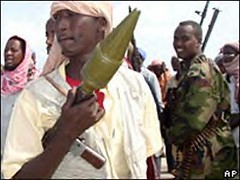
Somalis are increasingly armed against pro-western interventionist forces. The Ethiopian military is acting on behalf of US interests since the Union of Islamic Courts never threatened the sovereignty of its neighbors.
Originally uploaded by Pan-African News Wire File Photos
Tuesday, October 28
MOGADISHU
(AFP) - - Somalia's radical insurgents on Monday vowed to fight on despite Addis Ababa's pledge to respect a UN-sponsored deal reached a day earlier that allows for a pullback of Ethiopian troops.
The Somali government and an Islamist opposition umbrella group on Sunday agreed to implement a dormant June ceasefire, paving the way for pro-government Ethiopian troops to pull back from the country.
But Mukhtar Robow, a spokesman for Shebab militants, said: "We have already rejected the (peace) conference and its agreements. We are now saying again that we will not accept them.
"We will continue fighting against the enemies of Allah," he told reporters in Mogadishu.
The accord calls for Ethiopian troops to pull out of areas in Mogadishu and the central garrison town of Beledweyne by November 21, leaving them under the control of African Union troops in Somalia (AMISOM).
Under the deal, the Somali government and opposition Alliance for the Re-liberation of Somalia (ARS) are to assemble a 10,000-strong police force to help the peacekeepers control the areas.
Ethiopia said it would respect the agreement.
"We will respect this encouraging decision reached by the transitional government of Somalia and the ARS," Wahide Belay, a foreign ministry spokesman, told AFP.
"The agreement is in line with the Ethiopian position on orderly troop withdrawal," he said.
Ethiopia's arch-rival Eritrea said Somalia's stability required "the immediate, unconditional and full withdrawal of the occupying Ethiopian army," a foreign ministry statement said.
Ethiopia "not only exacerbated the situation but also committed war crimes and crimes against humanity," it added.
Asmara also called for the withdrawal of African Union peacekeepers, accusing them of being "a party to the conflict."
Regional leaders will this week meet in Kenya to discuss the Ethiopian pullback, a key demand of the Shebab insurgents who are continuing to fight in Mogadishu.
The meeting, organised by the Inter-Government Authority on Development (IGAD), will attempt to reconcile warring factions.
The meeting is "a build-up of the UN talks in Djibouti. We shall discuss agreements reached there, including implementing the ceasefire and Ethiopian troop pullout," an IGAD spokesman told AFP.
And another source inside IGAD said: "The conference will recommend ways of dealing with the Shebab and bringing the group into the peace process."
Shebab rebels have refused to participate in the talks and recognise the accords until Ethiopian forces withdraw from the country, with one leading Islamist, Hassan Dahir Aweys, rejecting the June agreement.
Foreign ministers from IGAD nations -- Kenya, Uganda, Sudan, Djibouti, Ethiopia and Somalia -- would meet both factions on Tuesday before a presidents' summit on Wednesday, the IGAD spokesman said.
A delegation from the ARS, dominated by moderate Islamists and based in Eritrea, was also expected to attend the meeting, he added.
Details of the Ethiopian pullback would be worked out by the two governments, IGAD and the United Nations, said officials.
In the capital meanwhile, the violence continued Monday.
Two people were killed in fighting that erupted after Ethiopia-backed Somali forces raided rebel hideouts in northern Mogadishu, witnesses said.
Ethiopian troops intervened to prop up the feeble Somali government at the end of 2006 and eventually drove the Islamists from much of the country's southern and central regions, where they had established Sharia law.
Since then, the Islamists have killed numerous government officials and vowed to fight until the Ethiopians and AMISOM troops, whom they regard as occupiers, withdraw.
Somali lawmakers, who have already endorsed the agreements, expressed support for the accords.
"We are always for peace and it has been proven beyond doubt that reconciliation is the only way out of the conflicts," said Musa Sudi Yalahow, a former Mogadishu warlord and now a lawmaker.
Somali has lacked an effective government since the 1991 ouster of dictator Mohamed Siad Barre. A resultant power struggle has defied numerous UN-backed attempts to end violence and restore a functional government.
No comments:
Post a Comment